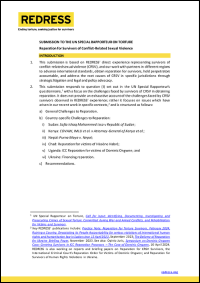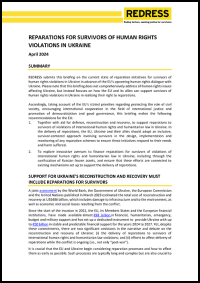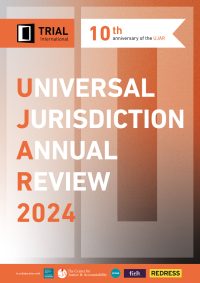Publications
REDRESS’ publications are also available in hard copy format. Please contact us for further information on [email protected].
Submission to the UN Special Rapporteur of Conflict-Related Sexual Violence on the challenges faced by survivors of conflict-related sexual violence (CRSV), in obtaining reparation. It is based on REDRESS’ direct experience representing survivors of CRSV, and our work with partners in different regions to advance international standards, obtain reparation for survivors, hold perpetrators accountable, and address the root causes of CRSV in specific jurisdictions through strategic litigation and legal and policy advocacy.
Briefing on the current state of reparation initiatives for survivors of human rights violations in Ukraine in advance of the EU’s upcoming human rights dialogue with Ukraine. The briefing focuses on how the EU and its allies can support survivors of human rights violations in Ukraine in realizing their right to reparations.
Now in its tenth edition, the Universal Jurisdiction Annual Review has continued to showcase the increasingly important role of universal jurisdiction in the fight against impunity. With 36 new investigations opened in 2023 and 16 convictions, the past year confirms this positive trend. However, the use of universal jurisdiction is not expanding evenly across countries. As long as cases continue to be concentrated in a few specific jurisdictions, the truly universal nature and potential impact of universal jurisdiction will remain unexploited. Read more in the report, released by TRIAL International in collaboration with Civitas Maxima, the Center for Justice and Accountability (CJA), the European Center for Constitutional and Human Rights (ECCHR), FIDH and REDRESS.
Consular assistance is a vital tool that enables the UK Government to offer protections to its
nationals detained overseas. However, the discretionary nature of consular assistance stands at
odds with the UK’s international obligations and falls short of the protection its nationals
deserve. Establishing a legal right to consular assistance for those suffering (or at risk of) human
rights violations would provide benefits not only to British nationals facing dire circumstances
abroad, but also to the British State, showing that British values do not stop at our borders.
Transforming consular assistance from a mere discretion into a legal obligation would ensure
more robust safeguards for British nationals at risk of human rights abuses abroad and solidify
the State’s responsibility to secure the rights and wellbeing of its most vulnerable citizens
Freedom from Torture and REDRESS wrote to PM Rishi Sunak urgently requesting to ensure that any intelligence provided by the Israeli authorities used by the UK to inform its response to this crisis has not been obtained by torture or other ill-treatment.
A joint civil statement from Egyptian and International human rights organisations calling on Egyptian authorities to immediately and unconditionally release Mahmoud Hussein who is facing 25 years in prison for wearing a t-shirt with an anti-torture slogan.
Over the last decade, the International Law Commission and the UN General Assembly have made progress in attempts to establish a Convention on Crimes Against Humanity (CAH). In this policy brief on a prospective CAH Convention, REDRESS, the International Federation for Human rights (FIDH), Global Survivors Fund (GSF) and TRIAL International voice support for a prospective CAH convention. This Convention can cement Customary International Law and fill an important existing gap in treaty law regarding crimes against humanity. The policy brief makes recommendations to States on reflecting progressive provisions on victims’ and survivors’ rights in a prospective CAH Convention
In March 2022, Roman Abramovich promised to sell Chelsea Football Club and donate the £2.5 billion to support victims of the war in Ukraine, nearly 7 times the value of humanitarian assistance provided by the UK to Ukraine so far. However, two years on, the sale has hit a stalemate and no money has been delivered to victims of the conflict. This briefing paper outlines how the UK Government can break the deadlock over the funds and direct them towards victims in Ukraine, as promised.








